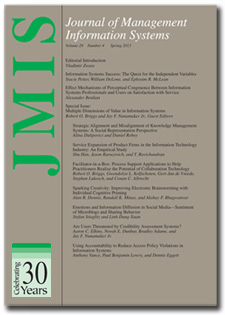激励动机多样化的人群:人群观念生成中的社会价值取向和报酬结构
IF 6.2
2区 管理学
Q1 COMPUTER SCIENCE, INFORMATION SYSTEMS
引用次数: 1
摘要
摘要:有些人在众包中出于亲社会的原因贡献想法;其他人这样做是出于自私的原因。该研究扩展了动机信息处理理论,认为亲社会个体和职业个体在群体观念生成中对奖励结构的反应不同。两个在线实验测量了参与者的亲社会取向与职业取向,并操纵了参与者是否获得了竞争或合作的奖励结构。研究2还操纵了参与者是看待原始想法还是共同的同伴想法。Proselfs在获得竞争性奖励时产生了更多的想法;亲社会的思想生成不受奖励结构的影响。这种互动效应是由任务努力调节的,并调节了同伴想法的影响。Proselfs在观看最初的同行想法并获得竞争性奖励时产生了最多的想法;亲社会人士没有观察到这种影响。该研究通过证明参与者对奖励结构的反应取决于他们的社会价值取向,为众包研究做出了贡献。这意味着,众包组织者应该设计任务和奖励,以便以亲社会和进步为导向激励参与者。本文章由计算机程序翻译,如有差异,请以英文原文为准。
Motivating the Motivationally Diverse Crowd: Social Value Orientation and Reward Structure in Crowd Idea Generation
ABSTRACT Some people contribute ideas for prosocial reasons in crowdsourcing; others do so for selfish reasons. Extending the theory of motivated information processing, the research posits that prosocial and proself individuals respond differently to reward structures in crowd idea generation. Two online experiments measured participants’ prosocial versus proself orientation and manipulated whether participants received a competitive or cooperative reward structure. Study 2 also manipulated whether participants viewed an original or a common peer idea. Proselfs produced more ideas when receiving competitive rewards; the idea generation of prosocials was not affected by the reward structure. This interaction effect was mediated by task effort and moderated the impact of peer ideas. Proselfs generated the most ideas when viewing an original peer idea and receiving competitive rewards; this effect was not observed for prosocials. The study contributes to crowdsourcing research by demonstrating that participants’ response to reward structures depends on their social value orientation. The implication is that crowdsourcing organizers should design tasks and rewards so they motivate participants with both prosocial and proself orientations.
求助全文
通过发布文献求助,成功后即可免费获取论文全文。
去求助
来源期刊

Journal of Management Information Systems
工程技术-计算机:信息系统
CiteScore
10.20
自引率
13.00%
发文量
34
审稿时长
6 months
期刊介绍:
Journal of Management Information Systems is a widely recognized forum for the presentation of research that advances the practice and understanding of organizational information systems. It serves those investigating new modes of information delivery and the changing landscape of information policy making, as well as practitioners and executives managing the information resource.
 求助内容:
求助内容: 应助结果提醒方式:
应助结果提醒方式:


